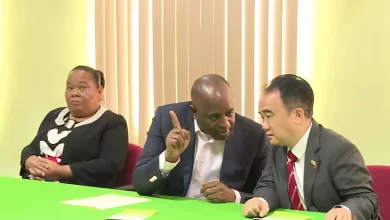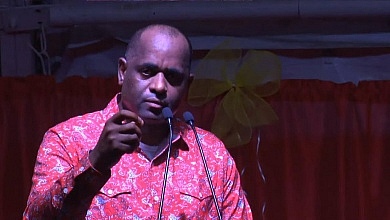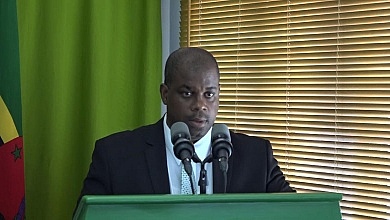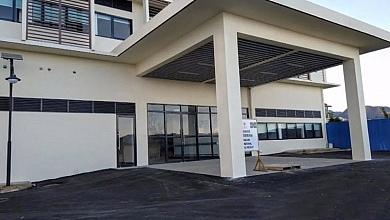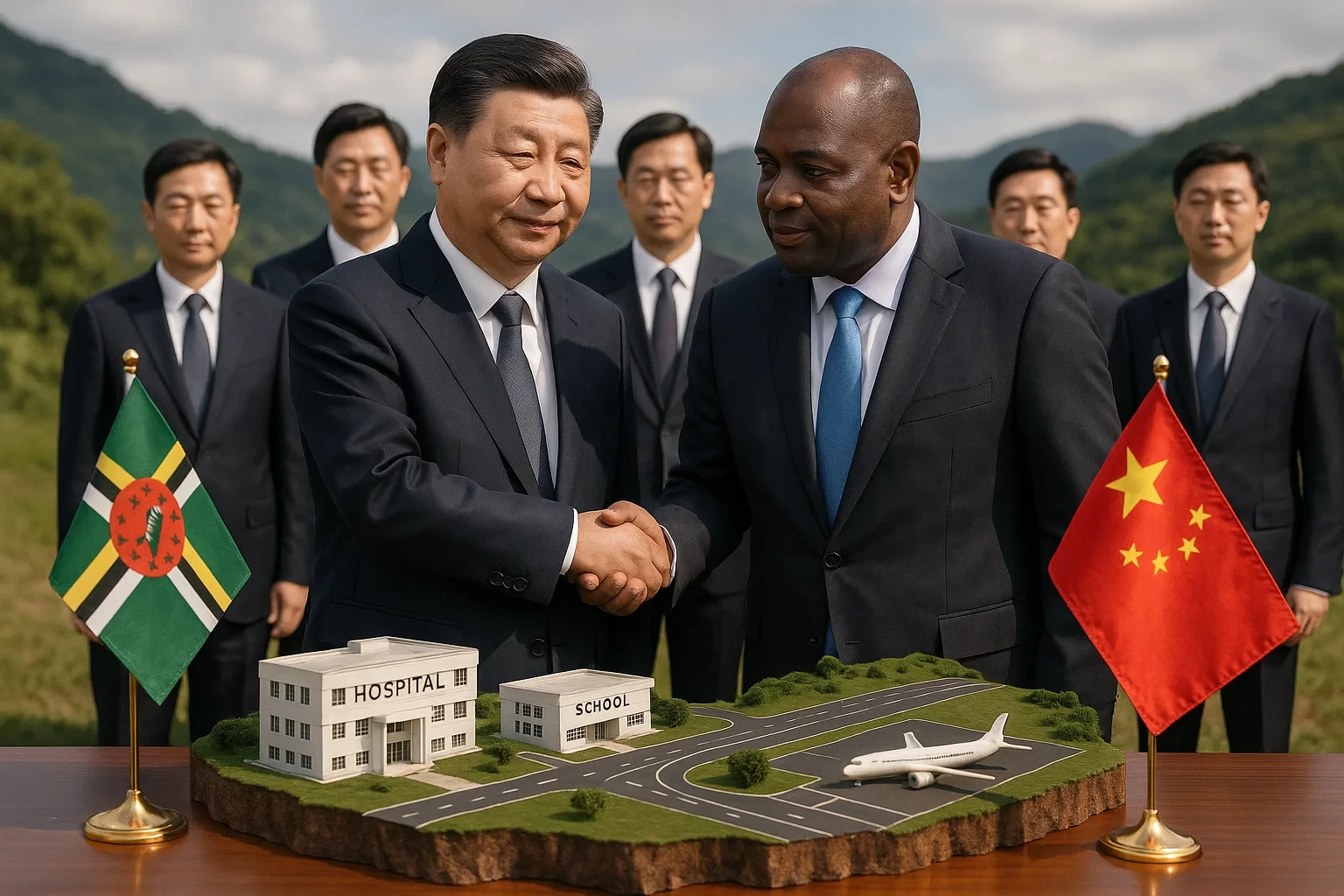
Dominica and China: Balancing Gifts with Long-Term Costs
In the past two decades, the Dominican agricultural sector support mechanisms, roads, and key public facilities have transformed in ways that are impossible to ignore. From the Dominica-China Friendship Hospital in Roseau to the Newtown Primary School rebuild after Hurricane Maria, and the reconstruction of the Hillsborough Bridge in Layou, the fingerprints of Chinese financing and technical assistance are embedded in our development story.
The question is not whether these projects exist or serve a purpose, they do. The question is whether the model we have embraced is sustainable and in our long-term national interest.
The Temptation of Big Projects
The appeal is obvious. When Prime Minister Roosevelt Skerrit cuts a ribbon on a modern hospital wing or a rebuilt school under initiatives like the China-Aid Project of Schools Reconstruction, it feels like progress you can see and touch. In moments like these, foreign partnerships, especially those with China, appear to deliver tangible results faster than traditional multilateral channels.
For a small island developing state with limited revenue and frequent disaster recovery costs, the promise of ready financing and technical manpower is difficult to turn down. Whether it’s the Loubière to Grand Bay Road Rehabilitation, the One Mile Agricultural Station, Portsmouth, or the Windsor Park Sports Stadium, these are not minor gestures, they are high-visibility investments in our public life.
Yet development financing, particularly when tied to bilateral political alignment, comes with strings, some visible, others less so. Our formal recognition of Beijing over Taipei in 2004 opened the door to deepened cooperation, but also to a set of obligations we rarely debate in the open.
The Dominica-China Friendship Hospital is a case in point. While the facility itself is a critical upgrade from the long-serving Princess Margaret Hospital, operational costs, maintenance responsibilities, and staff capacity remain ours to shoulder. If the hospital struggles to deliver consistent high-quality care, due to staffing shortages, specialist gaps, or equipment maintenance, the symbolism of the gift risks overshadowing its practical impact.
Avoiding the Easy Narratives
Some critics frame this as outright “debt trap diplomacy.” Others dismiss all concerns as anti-development paranoia. Both extremes miss the nuance.
Chinese aid and investment are not inherently exploitative. But neither are they purely altruistic. Beijing has clear geopolitical and economic objectives in the Caribbean, securing allies in international forums, expanding market access, and increasing influence in strategic locations.
It’s also too simple to blame the government alone. While leadership makes the deals, our political culture often rewards short-term gains and grand openings over long-term planning. Citizens cheer the projects and, in election years, allow ribbon-cuttings to stand in for structural reforms.
Chinese presence is not limited to state projects. Business ventures, retail outlets, and real estate acquisitions by Chinese nationals have increased, sometimes stirring quiet tension with local merchants and communities. In Portsmouth, shop owners have voiced unease over changing commercial dynamics.
We must be honest about these shifts. It is not xenophobic to discuss how external actors, whether Chinese, European, or American, integrate into our economic and social fabric. It is, in fact, necessary to avoid dependency models that make local entrepreneurship less competitive.
The Role of Local Leadership
Dominica has figures who have navigated this terrain with skill and others who have been less cautious. The late Roosevelt “Rosie” Douglas pursued strong international relationships as part of a broader development vision, but his tenure was short. In contrast, Skerrit’s administration has built the most extensive portfolio of China-backed projects in our history, often framing them as proof of his government’s ability to secure international goodwill.
This approach has delivered physical infrastructure, yes, but without equivalent investment in domestic capacity, our reliance deepens.
Our Eastern Caribbean neighbours offer lessons. Grenada has partnered with China on projects like the national cricket stadium but has balanced this with diversified foreign relations. Barbados, while not in the OECS, has pursued climate finance and renewable energy investment from multiple partners, reducing dependence on any single state.
Dominica, by contrast, appears to have placed heavier diplomatic weight on the China relationship. That’s a strategic choice, but one that carries strategic risks.
When the Ribbon is Cut, the Work Begins
A building’s opening ceremony is the start, not the end, of the development process.
For example, Windsor Park Stadium, gifted by China, became a regional cricket venue but required significant upkeep, which the government had to fund amid competing priorities. Similarly, hospital infrastructure without sustainable staffing and continuous training risks becoming an expensive symbol rather than a functional upgrade.
This is where project planning must mature, integrating life-cycle costs, maintenance strategies, and domestic skill-building into every foreign-assisted initiative.
The relationship between Dominica and China is often discussed as though it were only a matter for politicians and diplomats. But public attitudes shape the space leaders operate in. When we, as citizens, reward visible short-term gains and neglect to demand long-term planning, we encourage a political environment where dependency flourishes.
This is not to diminish the role of government oversight. It is to recognise that a politically engaged, informed citizenry is the best safeguard against agreements that prioritise prestige over practicality.
The Way Forward
We should move forward by maintaining ties with China but insisting on more balanced terms. Major agreements involving infrastructure, land, or debt should be made public, and each project must include a clear skills-transfer plan. This ensures that Dominicans can operate and maintain what is built, reducing dependency while building our technical confidence. Broadening investment sources will also reduce vulnerability to any single partner’s priorities.
Alongside government action, national dialogue must become routine. Communities should have open forums to question, understand, and shape the trade-offs in foreign partnerships. By diversifying our economic alliances and embedding capacity-building into every deal, we can protect our sovereignty while still benefiting from international cooperation. This is not about rejecting outside help but about ensuring that it strengthens, rather than compromises, Dominica’s independence and resilience.
The truth is that foreign influence does not arrive solely because another nation wants to exert it. It thrives because we make space for it, sometimes out of need, sometimes out of ambition, and sometimes out of habit.
Dominica’s partnerships with China have delivered undeniable benefits, from the Dominica State College’s new facilities to the modernisation of key agricultural initiatives. But they have also deepened our exposure to external leverage.
If we are serious about sovereignty, we must stop treating it as an abstract political slogan and start protecting it as a practical, everyday reality, in how we plan our infrastructure, in how we educate our workforce, and in how we decide whose help we will accept, and on what terms.
The Dominica-China story is still being written. Whether it becomes a chapter on smart cooperation or a cautionary tale is largly up to us.
This article is copyright © 2025 DOM767





